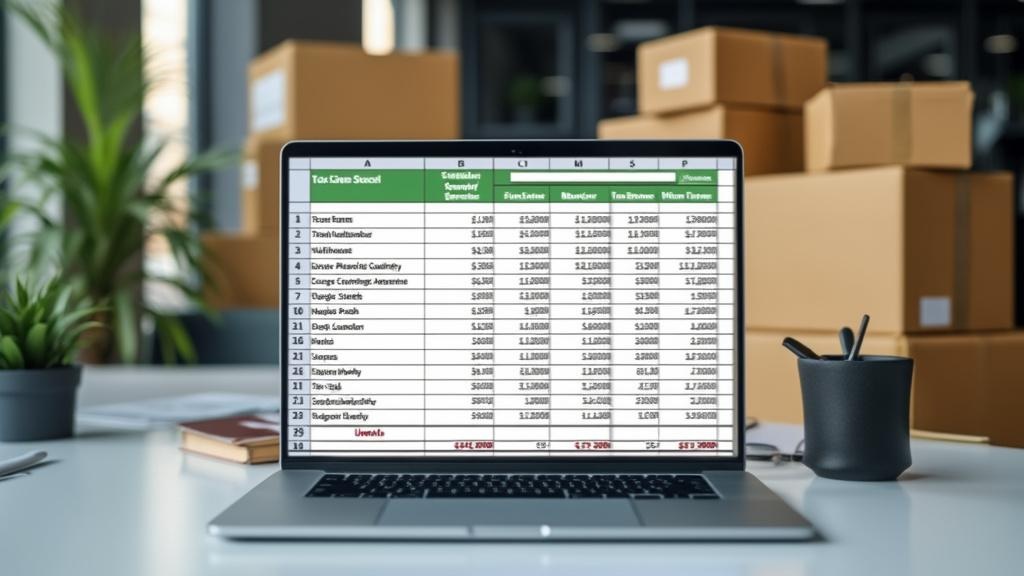Sales tax compliance stands as an essential pillar for every dropshipper aiming for success. Mastering your responsibilities can significantly reduce penalties while enhancing operational efficiencies.
Navigating sales tax for dropshippers means recognizing how tax obligations differ across states, which directly impacts your bottom line.
Simplifying this process not only boosts profitability but also allows you to concentrate on fostering growth and elevating customer satisfaction.
Click here to learn more about: tax implications for dropshippers
Sales Tax Obligations Demystified
Sales tax compliance plays a pivotal role for dropshippers operating across various jurisdictions.
Tax rates can fluctuate significantly from state to state, impacting your pricing strategies and legal responsibilities. Engaging with previous discussions reveals the importance of understanding consumer responsibilities in tax compliance; there exists a shared obligation between sellers and buyers.
To facilitate accurate reporting, maintaining meticulous transaction records is paramount for audit preparedness.
Tip: Employ compliance tools or specialized accounting software to streamline your record-keeping processes.
Record Keeping for Audits
Accurate record keeping serves as a shield against potential tax liabilities. Each transaction should be consistently documented to ensure a seamless audit experience, thus minimizing risks associated with compliance failures.
Leveraging technology can enhance your management of transaction records, aiding in your quest to meet all sales tax obligations.

How Nexus Affects Dropshipping
Grasping the impact of nexus on dropshipping is essential for ensuring compliance and maintaining financial health. Nexus establishes the connection between a business and a state that mandates tax collection.
Both physical presence, such as warehouse locations, and economic nexus, which is determined by sales thresholds, play key roles in shaping your sales tax obligations.
Notably, economic nexus can lead to unexpected compliance issues, as many states are now enforcing new thresholds.
It’s imperative to monitor these state laws continuously to avoid potential liabilities. Consider leveraging tools like Avalara and TaxJar; these solutions effectively track nexus changes, ensuring that dropshippers remain compliant amidst evolving regulations.
Exploring Tax Automation Solutions
Adopting tax automation can significantly enhance your taxation processes.
Automated systems streamline workflows and minimize errors, creating a more efficient environment compared to manual approaches. Popular software options such as QuickBooks and TaxCloud offer integrated solutions designed to enhance compliance, accuracy, and time efficiency.
Key Software Options
Utilizing the right software is critical for smooth tax automation.
Here are top choices:.
- QuickBooks: A leading accounting software with tax automation capabilities.
- TaxCloud: A robust solution that handles compliance effortlessly.
- TaxJar: Simplifies multistate tax management for dropshippers.
Success Story of Tax Automation
A compelling case study illustrates a dropshipper who integrated tax automation, ultimately achieving improved efficiency and lower compliance risks. By embracing tax automation, businesses can allocate valuable resources towards growth and enhancing customer satisfaction. Don’t let outdated methods hinder your business’s potential; invest in smarter tax management today!
Nexus and Tax Automation
- Nexus can be established through physical presence or economic thresholds, impacting sales tax obligations.
- Many states have updated their nexus laws, making it crucial for businesses to stay informed to avoid liabilities.
- Tax automation can reduce errors and improve efficiency, allowing businesses to focus on growth.
- Using software like QuickBooks and TaxJar can streamline tax compliance and management for dropshippers.
What Are The Exemptions For Ecommerce
Exemptions play a pivotal role in managing tax liabilities for your ecommerce business. By leveraging these exemptions, you can refine your compliance strategy, which ultimately minimizes unnecessary costs.
One significant example is the resale exemption, enabling businesses to purchase inventory tax-free with the intent to resell.
This strategy can be especially advantageous for dropshipping operations.
Many states offer exemptions for digital goods from sales tax, making it essential to verify local tax rates as they can differ significantly.
For instance, Delaware provides a unique advantage by not imposing sales tax, a detail that can drastically improve your online sales strategy.
Common Types of Exemptions
- Resale Exemption: Applicable for items intended for resale.
- Digital Goods Exemption: Varies by state, often excluding digital products from sales tax.
- Nonprofit Exemption: Often available for qualified nonprofit organizations.
- Manufacturing Exemption: Certain machinery and materials may qualify.
Navigating Multistate Tax Regulations
Businesses operating in multiple states encounter various complexities regarding tax compliance. The concept of nexus is key, as it determines tax obligations based on physical or economic presence across jurisdictions. To thrive, you must stay updated on fluctuating tax rates and exemption rules. Utilizing compliance tools and consulting with tax professionals will provide necessary insights into evolving state laws.
Here are strategies to simplify your navigation through multistate tax regulations:
- Regularly monitor changes in state laws regarding taxation.
- Implement tax automation tools to streamline compliance processes.
- Maintain open communication with tax professionals to align your business strategies with current regulations.
- Keep thorough transaction records for audits and compliance checks.
By proactively managing these aspects, you reduce the risk of unnecessary liabilities and ensure smooth operations throughout compliance audits. Engage in strategic planning to maintain a competitive edge in the ecommerce landscape.
| Exemption Type | Description | Applicable Entities |
|---|---|---|
| Resale Exemption | Allows businesses to purchase inventory tax-free for resale. | Retailers, Dropshipping businesses |
| Digital Goods Exemption | Exempts certain digital products from sales tax, varies by state. | Online retailers of digital products |
| Nonprofit Exemption | Available for qualified nonprofit organizations to avoid sales tax. | Nonprofit organizations |
| Manufacturing Exemption | Exempts certain machinery and materials used in manufacturing. | Manufacturers |
Key Considerations For Tax Professionals
The landscape of ecommerce presents unique challenges and opportunities for tax professionals. As they navigate through complex regulations, the role of tax professionals becomes increasingly paramount.
Automation tools significantly enhance compliance, enabling professionals to manage sales tax efficiently for online retailers, including dropshipping businesses.
By embracing these integrated solutions, tax professionals can save time, reduce errors, and focus on strategic planning while ensuring clients meet their tax obligations.
Ongoing education is not just a suggestion; it is a necessity.
Tax regulations are constantly evolving, and staying informed about the latest trends ensures that professionals can effectively guide clients through compliance challenges. Continuous learning builds not only expertise but also fosters trust and stronger relationships in a dynamic marketplace.
Embrace the journey of education and position yourself as a vital resource in the field.
Managing Tax Rates For Online Sales
Effective management of tax rates is essential for navigating the complexities of sales tax. Tax professionals should recognize key factors that influence tax rate changes across multiple jurisdictions.
The variability of state laws directly impacts sales tax obligations for ecommerce transactions, making it crucial to stay informed and prepared.
Understanding Factors Influencing Tax Rate Changes
Tax professionals must identify taxable items and nontaxable items within their clients’ inventories.
Each jurisdiction has its own rules regarding exemptions and liabilities.
By keeping abreast of these differences, professionals can minimize potential liabilities for online sellers.
Practical Approaches for Rate Adjustments
Implementing software solutions can streamline the process of adjusting tax rates across various states. Automating these adjustments not only saves time but also enhances accuracy, helping tax professionals avoid costly errors.
By utilizing integrated solutions, they can ensure timely registration and compliance with diverse tax obligations, simplifying the management of online sales.
Enhance your operational efficiency today by streamlining your rate adjustments and staying ahead of taxation trends!
Act now! Begin refining your approach to managing tax rates and empower your clients to confidently navigate their sales tax responsibilities.
| Key Factors | Impact on Tax Professionals |
|---|---|
| Ongoing Education | Essential for staying updated on evolving tax regulations |
| Automation Tools | Enhance compliance and efficiency in managing sales tax |
| Jurisdiction Variability | Directly affects sales tax obligations for ecommerce transactions |
| Software Solutions | Streamline tax rate adjustments and improve accuracy |
Preparing For Sales Tax Audits
Being adequately prepared for a sales tax audit significantly enhances your peace of mind and financial security. Start the process by maintaining accurate transaction records that ensure every sale and tax collected is meticulously documented.
Regular reviews of these records not only enhance your readiness for potential audits but also contribute to essential compliance with state laws.
Establish Structured Internal Audits
Implementing a structured approach to your internal audits proves invaluable.
Schedule them at regular intervals, using compliance checklists that encompass all relevant aspects, including sales tax obligations and exemptions.
This proactive strategy guarantees you stay informed about any changes in tax rates across different jurisdictions.
Enhance Your Recordkeeping System
By prioritizing an effective recordkeeping system, you not only boost your audit preparedness but also improve your overall business efficiency. A strong compliance framework ensures that you are not just preparing for an audit; you are also reinforcing your compliance strategy and promoting a trustworthy reputation in the marketplace.
Don’t leave your financial future to chance—take proactive measures today to safeguard your business! Implementing the right management and organizational tools will streamline your internal audits, ensuring that you meet your sales tax permit obligations effectively.
Start your audit preparation journey now, and make your business a model of financial integrity and compliance.
Sales Tax Audit Preparedness
- Maintaining accurate transaction records can reduce audit time and stress.
- Regular internal audits can lead to early detection of compliance issues.
- Effective recordkeeping systems can enhance overall business efficiency.
- Proactive tax management helps avoid penalties and fosters trust with stakeholders.
Dropshipping And Income Tax Explained
Tax Implications For Dropshippers Explained


